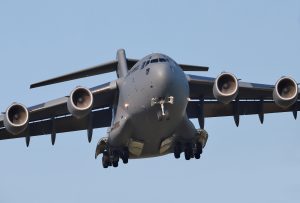The Indian Air Force is, for the first time, participating in an annual multinational air exercise hosted by the United Arab Emirates. In a statement about the sixth edition of Exercise Desert Flag, which began on March 3 and will continue until March 21, the India Ministry of Defense noted that the “IAF is participating with six Su-30 MKI, two C-17 and one IL-78 tanker aircraft. C-17 Globemaster will provide support for induction/ de-induction of the IAF contingent. Su-30 MKI aircraft will undertake long range ferry, routing direct from India to the exercise area with aerial refueling support from IL-78 tanker aircraft.”
“The aim of the exercise is to provide operational exposure to the participating forces while training them to undertake simulated air combat operations in a controlled environment. The participating forces will get an opportunity to enhance their operational capabilities along with mutual exchange of best practices,” it also stated.
Along with India and the UAE, air forces from the United States, France, Saudi Arabia, South Korea and Bahrain will also participate in the exercise, being held at the Al-Dhafra airbase.
“The large-scale exercise involving diverse fighter aircraft from across the globe will provide the participating forces, including IAF, a unique opportunity to exchange knowledge, experience, enhance operational capabilities and interoperability,” the Indian Ministry of Defense statement claimed.
Despite the pandemic and ensuing restrictions, India’s military exercises with what it terms “friendly foreign countries” have continued unabated in the past few months. The Indian Army exercised with its U.S. counterparts in the 16th edition of the Yudh Abhyas series last month, while the Indian and the French air forces participated in Desert Knight 2021 in January, which the Indian Ministry of Defense had described as a “first of its kind bilateral exercise,” involving Su-30 MKI, Mirage and Rafale jets. Both exercises were held in the western Indian state of Rajasthan.
But the Desert Flag exercise assumes additional salience, given that it visibly highlights deepening political and defense ties between India and Middle Eastern powers such as the UAE and Saudi Arabia – arguably a major Indian foreign policy achievement under Prime Minister Narendra Modi. Historically, India’s relations with these countries had been convoluted, and at times antagonistic, due to a range of factors.
In December last year, General M.M. Naravane visited Saudi Arabia and UAE, marking the first time an Indian army chief had visited the countries. Naravane’s UAE visit agenda also included defense coproduction, with an Indian government source telling The Print: “Both countries top the list when it comes to defense imports. Both countries are focusing on developing their indigenous capability and this is an area that they can collaborate on.”
Providing yet another data point illustrating the growing India-UAE defense ties, an Emirati Airbus tanker provided midair refueling support for three new Rafale jets on their way to India from France, where they were manufactured, in January.
“Exercising and interaction with the participating nations in a dynamic and realistic warfare environment will also contribute to strengthen international relations,” the Indian Ministry of Defense statement on the ongoing Desert Flag exercise noted.

































